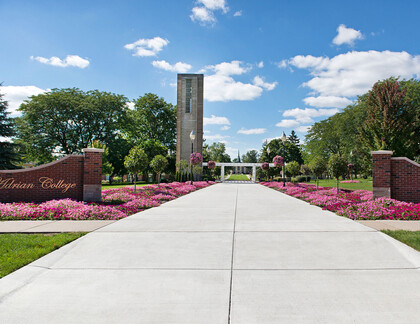Why Adrian?
Whatever your background, Áù¾ÅÉ«Ìà can provide you with the skills and experience you need to realize your dreams.

Why Adrian?
Whatever your background, Áù¾ÅÉ«Ìà can provide you with the skills and experience you need to realize your dreams.

Undergraduate Studies
We offer an undergraduate program of study that’s small enough to be personal

Graduate Studies
Pursuing your dream career starts with the next phase of your education. When you enroll in graduate school at Áù¾ÅÉ«ÌÃ, you’re beginning more than advanced training in your field; you’re accelerating your professional journey.
Our department offers three degree programs – A Bachelor of Arts (B.A. – Biology), a Bachelor of Science (B.S. – Biology), and a Bachelor of Science in Biology – Neuroscience (B.S. Biology – Neuroscience).
Each has a similar core of courses in Biology and allied fields, and then electives from which you may choose. Generally speaking, students spend their first two years gaining foundations in the major subfields of biology, along with a core of math and chemistry. The junior and senior years are allotted to higher level, elective courses that allow the student to gain greater depth in some aspects of biology, specialize and prepare for their next steps. In addition, there is a seminar series for juniors and seniors that prepares and builds research, writing, and communications abilities in biology.
BIOL131 Plant Biology (4)
BIOL132 Animal Biology (4)
BIOL217 Principles of Ecology (3)
BIOL221 Principles of Genetics (3)
BIOL301 Junior Seminar (1)
BIOL326 Microbiology (4)
BIOL401 Capstone: Senior Seminar (2)
CHEM105 General Chemistry (3)
CHEM106 General Chemistry II (3)
CHEM117 Introductory Chemistry Laboratory I (1)
CHEM118 Introductory Chemistry Laboratory II (1)
MATH115 Pre-Calculus Mathematics (4)
Choose 10 hours required from the following:
BIOL130 Local Flora (3)
BIOL199 Exploratory Internship (1-3)
BIOL203 Histology (3)
BIOL212 Vertebrate Zoology (4)
BIOL218 Ecology Laboratory (1)
BIOL223 Genetic Laboratory (1)
BIOL262 Invertebrate Zoology (4)
BIOL285 Biostatistics (3)
BIOL299 Experimental Course (1-3)
BIOL309 Topics in Biology (1-4)
BIOL310 Neurobiology (4)
BIOL 312 Principles of Neuropharmacology (3)
BIOL315 Pathophysiology (3)
BIOL324 Conservation Biology (3)
BIOL327 Advanced Microbiology (3)
BIOL333 Biochemistry (3)
BIOL334 Biochemistry Laboratory (1)
BIOL343 Molecular Cell Biology (3)
BIOL345 Methods in Molecular Biology (3)
BIOL351 Plant Physiology (3)
BIOL352 Plant Ecology (4)
BIOL355 Evolutionary Biology (3)
BIOL364 Entomology (4)
BIOL365 General Physiology (4)
BIOL366 Biology of Parasites (4)
BIOL369 Developmental Biology (3)
BIOL370 Immunology (3)
BIOL375 Animal Behavior & Communication (4)
BIOL378 Ichthyology (4)
BIOL379 Herpetology (4)
BIOL380 Ornithology (4)
BIOL381 Mammalogy (4)
BIOL399 Professional Internship (1-12)
BIOL450 Biology Research
BIOL451 Independent Study
BIOL455 Human Anatomy (4)
BIOL499 Advanced Experimental Course (1-3)
Students are strongly urged to include a systematics course (BIOL130, BIOL212, BIOL262, BIOL364, or BIOL366) within their program. A maximum of three credits of BIOL451 and four credits of BIOL199 or BIOL399 may be counted toward the required 31 credits of biology. Students are required to take a biological knowledge assessment test during their final year, usually when taking their capstone course. Students are encouraged to take additional course work in chemistry.
BIOL131 Plant Biology (4)
BIOL132 Animal Biology (4)
BIOL217 Principles of Ecology (3)
BIOL218 Ecology Laboratory (1)
BIOL221 Principles of Genetics (3)
BIOL223 Genetics Laboratory (1)
BIOL301 Junior Seminar (1)
BIOL326 Microbiology (4)
BIOL401 Capstone: Senior Seminar (2)
CHEM105 General Chemistry (3)
CHEM117 Introductory Chemistry Laboratory I (1)
MATH115 Pre-Calculus Mathematics (4)
Choose 7 hours required from the following:
CHEM106 General Chemistry II (3)
CHEM118 Introductory Chemistry Laboratory II (1)
CHEM224 Organic Chemistry I (3)
CHEM225 Organic Chemistry II (3)
CHEM226 Organic Chemistry Laboratory I (1)
CHEM227 Organic Chemistry Laboratory II (1)
CHEM341 Biochemistry I (3) *
CHEM344 Biochemistry Laboratory (1) **
*BIOL333 will be accepted as a substitute.
**BIOL334 will be accepted as a substitute.
Choose 15 hours required from the list above for B.A.
BIOL 131 Plant Biol (4)
BIOL 132 Animal Biol (4)
BIOL 217 Ecology (3)
BIOL 221 Genetics(3)
BIOL 301 Jr. Sem (1)
BIOL 310 Neurobiology (4)
BIOL 326 Microbiology (4)
BIOL 401 Sr. Sem (2)
MATH 115 Pre-Calc (4)
CHEM 105 Gen. Chem I (3)
CHEM 117 Gen. Chem Lab I (1)
CHEM 106 Gen Chem II (3)
CHEM 118 Gen Chem Lab II (1)
PSYC 100 Gen. Psych (3)
PSYC 211 Statistics (4)
PSYC 341 Biopsychology (3)
Two semesters of Organic Chemistry with Lab, or two semesters of Physics with Lab, or one semester of Organic Chemistry with Lab and one semester of Physics with Lab. (8 of the 30 credits):
CHEM 224 Organic Chem I (3)
CHEM 226 Organic Chem Lab I(1)
CHEM 225 Organic Chem II (3)
CHEM 227 Organic Chem Lab II (1)
PHYS 101 Intro. Physics I (3)
PHYS 103 Intro. Physics Lab I (1)
PHYS 102 Intro Physics II (3)
PHYS 104 Intro Physics Lab II (1)
PHYS 205 General Physics I (3)
PHYS 209 General Physics Lab I (1)
PHYS 206 General Physics II (3)
PHYS 210 General Physics Lab II (1)
At least 7 credits, including at least one course from each dept. (BIO and PSYC)
BIOL 312 Principles of Neuropharmacology (3)
BIOL 315 Pathophysiology (3)
BIOL 365 Physiology (4)
BIOL 369 Developmental Bio. (4)
BIOL 375 Animal Behavior and Communication (4)
PSYC 303 Abnormal Psychology (4)
PSYC 313 Cognitive Psychology (3)
PSYC 322 Learning Theory (3)
PSYC 212 Research Methods for Non-majors (4)
PSYC 265 Research Methods for Majors (4)
BIOL 451 Independent Study—must be lab research project in a neurobiology area for at least two semesters for a total of 3 credits (3).
CHEM 341 Biochemistry I (3)
CHEM 344 Biochemistry Lab (1)
MATH 135 Calculus I (4)